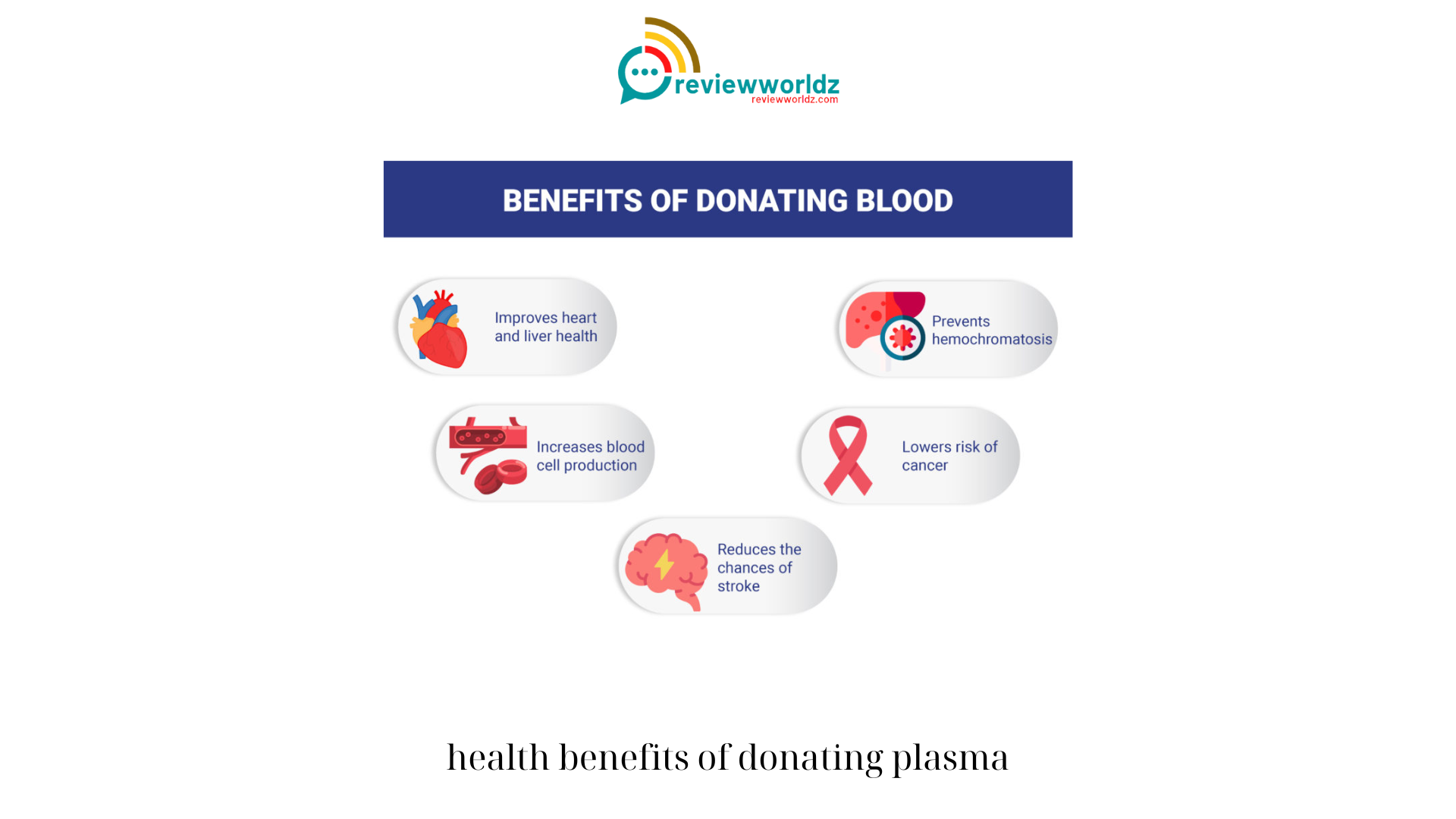Donating plasma is a remarkable act of generosity that not only helps those in need but also offers numerous health benefits to the donor. Plasma, the liquid component of blood, contains essential proteins and antibodies that play a crucial role in maintaining overall health. In this article, Reviewworldz will explore the health benefits of donating plasma, shedding light on the positive impact it can have on the donor’s well-being while making a difference in the lives of others.
Health Benefits of Donating Plasma: A Selfless Act with Personal Rewards
Donating plasma is not only a selfless act of kindness but also offers significant health benefits to the donor. From boosting the immune system and reducing the risk of cardiovascular diseases to health benefits of donating plasma weight management and regulating iron levels, plasma donation positively impacts various aspects of one’s well-being. In addition to the physical benefits, plasma donation also contributes to mental well-being through a sense of fulfillment and reduced stress levels. As individuals consider giving the gift of plasma, they can be assured that their act of generosity will not only help others but also leave a positive and lasting impact on their own health.
- Understanding Plasma Donation:
a. The Importance of Plasma: Plasma is a vital component of blood, comprising approximately 55% of its total volume. It carries nutrients, hormones, and proteins throughout the body, while also serving as a key defense mechanism against infections.
b. The Donation Process: Plasma donation involves the extraction of plasma from the donor’s blood through a process called plasmapheresis. During this procedure, whole blood is drawn, and the plasma is separated and collected, while the remaining blood components are returned to the donor.
- Boosts the Immune System:
a. Antibody Production: Plasma contains antibodies, which are proteins that help the body fight off health benefits of donating plasma and diseases. By donating plasma, individuals stimulate the production of new antibodies, strengthening their immune system in the process.
b. Enhancing Immunity: Regular plasma donation can lead to an increase in the number of white blood cells, which are responsible for identifying and neutralizing foreign substances in the body. This enhanced immune response can provide better protection against illnesses.
- Reduces the Risk of Cardiovascular Diseases:
a. Lowering Cholesterol Levels: Plasma donation has been shown health benefits of donating plasma to reduce cholesterol levels in the donor’s blood. High levels of cholesterol are associated with an increased risk of cardiovascular diseases such as heart attacks and strokes. Regular plasma donation helps maintain healthy cholesterol levels, thereby reducing the risk of these conditions.
b. Improving Blood Flow: Donating plasma helps maintain optimal blood viscosity, preventing the accumulation of excess blood cells and reducing the strain on the cardiovascular system. Improved blood flow promotes overall cardiovascular health.
- Metabolic Benefits:
a. Weight Management: Plasma donation can contribute to health benefits of donating plasma management efforts. Each plasma donation removes a certain amount of calories from the donor’s body, which, when combined with a balanced diet and regular exercise, can aid in weight loss or maintenance.
b. Enhanced Nutrient Absorption: Plasma donation stimulates the body to produce new blood cells, leading to an increase in red blood cell count. This increased production improves the delivery of oxygen and nutrients to various organs, enhancing overall metabolic efficiency.
- Iron Regulation:
a. Preventing Iron Overload: Regular plasma donation helps health benefits of donating plasma iron levels, particularly in individuals with hereditary conditions that cause iron accumulation in the body. By reducing excess iron, plasma donation protects against the potential negative health effects of iron overload.
b. Promoting Iron Replacement: Plasma donation can also contribute to the availability of iron for individuals with iron deficiency. The removal of a small amount of plasma during donation prompts the body to utilize stored iron reserves, encouraging the production of new red blood cells.
- Psychological Benefits:
a. Sense of Purpose and Fulfillment: Donating plasma provides an opportunity for individuals to make a positive impact on the lives of others. This act of altruism can foster a sense of purpose, contributing to improved mental well-being and overall life satisfaction.
b. Stress Reduction: Engaging in acts of kindness, such as plasma donation, has been linked to reduced stress levels. The act of giving and helping others triggers the release of endorphins, which promote feelings of happiness and relaxation.
- Regular Health Monitoring:
a. Pre-Donation Screening: Prior to each plasma donation, donors undergo a thorough screening process where their vital signs are measured, and their medical history is reviewed. This regular health evaluation provides an opportunity for early detection of potential health issues.
b. Post-Donation Care: Plasma donation centers often health benefits of donating plasma post-donation care, including regular check-ups and monitoring. This ongoing support ensures that donors’ health is closely monitored and any emerging conditions can be addressed promptly.
Conclusion
Donating plasma is not only a health benefits of donating plasma act of kindness but also offers significant health benefits to the donor. From boosting the immune system and reducing the risk of cardiovascular diseases to promoting weight management and regulating iron levels, plasma donation positively impacts various aspects of one’s well-being. In addition to the physical benefits, plasma donation also contributes to mental well-being through a sense of fulfillment and reduced stress levels. As individuals consider giving the gift of plasma, they can be assured that their act of generosity will not only help others but also leave a positive and lasting impact on their own health.









